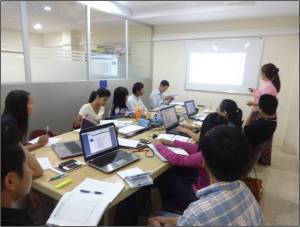 On September 25th and 26th 2014, there was an internal training about Myanmar’s labor laws and occupational health and safety laws at the SMART Myanmar office. The training from an attorney with Polastri, Wint & Partners law firm was designed to provide a comprehensive awareness of the existing Labour and Occupational Health and Safety laws in Myanmar as well as government rules, orders, directives, notifications, common procedures and regulations.
On September 25th and 26th 2014, there was an internal training about Myanmar’s labor laws and occupational health and safety laws at the SMART Myanmar office. The training from an attorney with Polastri, Wint & Partners law firm was designed to provide a comprehensive awareness of the existing Labour and Occupational Health and Safety laws in Myanmar as well as government rules, orders, directives, notifications, common procedures and regulations.
To improve the quality and production capacity of garment factories, it is of course necessary for the SMART team to be compliant with the legal requirements in the existing legal framework. Also, this training helps the SMART team build an understanding as to how critical issues in factories – especially those things related to social compliance – are identified and handled.
The training was conducted by Daw Wint Thandar Oo, Co-founder of PWP and who has more than thirteen years of experience in corporate and commercial matters in Myanmar and U Tin Sein, Senior Associate at Polastri, Wint & Partners, himself experienced as a former law lecturer of the University of Yangon for 14 years. Both Presenters prepared the presentation “The Existing Labor, Occupational Health and Safety Laws of Myanmar” and explained the laws briefly and 12 existing labor laws out of 22 had been introduced. Specific training contents included:
1. Labor related provisions in 2008 Constitution of the Union of Myanmar
2. The Factory Act, 1951
3. The Oil-Field (Labor and Welfare) Act, 1951
4. The Leave and Holiday Act, 1951
5. The Shops and Establishment Act, 1951
6. The Social Security Law, 2014, The Social Security Rules, 2014
7. The Payment of Wages Act, 1936
8. The Minimum Wages Law, 2013, The Minimum Wages Rules, 2013
9. The Employment and Skill Development Law,2013
10. The Workmen’s Compensation Act, 1923
11. The labor Organization Law, 2011, The Labor Organization Rules, 2012
12. The Settlement of labor Dispute Law, 2012, The Settlement of Labor Dispute Rules, 2012
During the training, all participants raised questions and actively discussed about the laws and penalties. Especially, everyone discussed about workplace safety and health measures, working hours, overtime, working on days-off and calculation methods for overtime and penalties. Interestingly, the current social security law gives substantial protection to workers, with benefits available for sickness, maternity leave, employment injury, invalidity benefits, superannuation benefits, medical treatments, and the right to residency. Therefore, it can be said that the legal framework regarding OHS laws in Myanmar is perhaps not lacking so much as enforcement of that framework which is lacking.
Understanding the OHS laws fully is critically important, as SMART’s SCP Assistants are ideally placed to pass this knowledge along to the factory owners and managers with whom they closely work to help ensure compliance and, consequently, healthier and safer factories.










